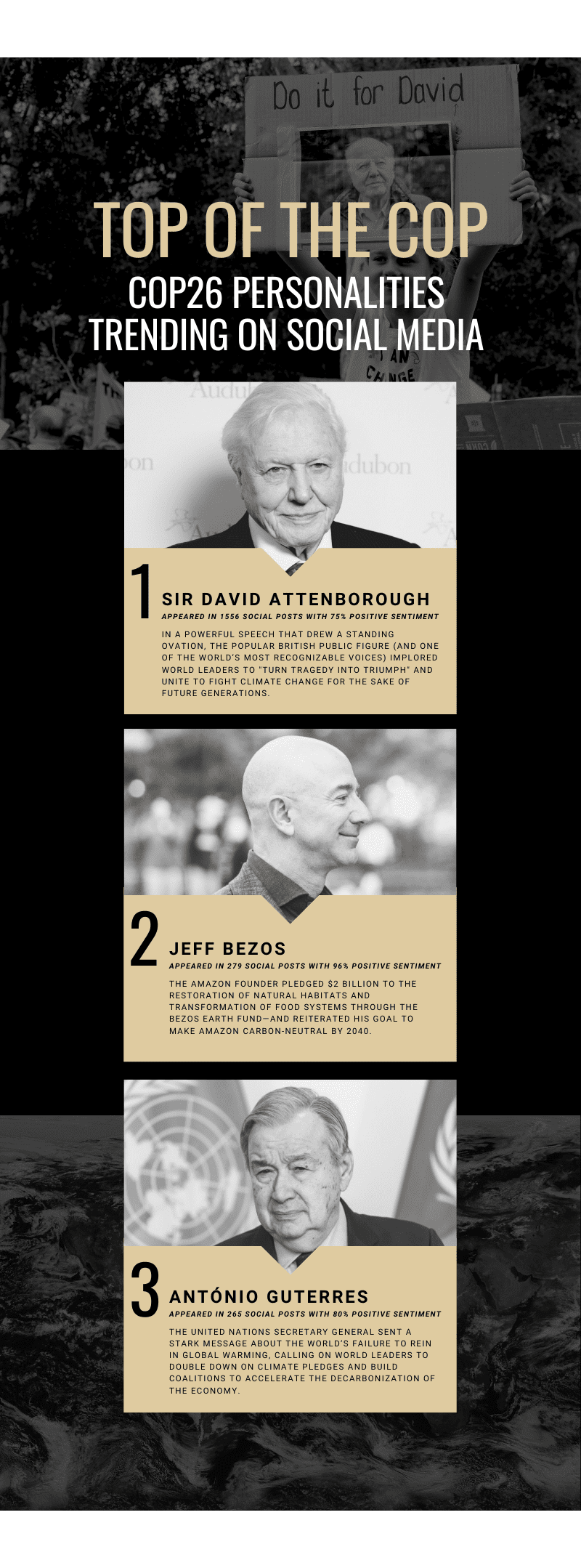News and Insights
Another Green World: Trending Climate Conversations from COP26
November 19, 2021
By Annabelle Wong and Keith Boi
The recently concluded COP26 climate summit has been described as a pivotal moment for countries to commit to decisive action on decarbonization. The two-week summit came to a close with nearly 200 nations agreeing to accelerate climate action and to “revisit and strengthen their current emissions targets to 2030”—a compromise deal that some observers say fell short of what’s needed to address rising global temperatures.
As world leaders gathered in Glasgow to discuss the paths forward for climate cooperation, what’s equally apparent is that public concerns over environmental issues are escalating. A recent YouGov survey found that up to two-thirds of global consumers are worried about climate change. In the Asia Pacific region, these concerns are most pronounced in countries such as India (77% of consumers); Singapore (76%); Indonesia (73%) and Hong Kong (72%).
Amid the online chatter and surge in digital content related to climate change, we wanted to get a better perspective of the topics that have been gaining traction among the wider public in the weeks leading up to and during COP26. Here’s a closer look at the key conversations and issues that are driving the most engagements on social media[1]:
- A “code red for humanity” ahead of climate talks: Released less than three months before COP26, a landmark report by the UN’s Intergovernmental Panel on Climate Change (IPCC) issued a stark warning about the state of the global climate crisis, with UN Secretary General António Guterres calling it a “code red for humanity”. New analysis by watchdog group Climate Action Tracker further raised concerns that the world is on track for a temperature rise of more than 2.4°C by the end of this century in spite of the COP26 pledges.
CAT global update: Glasgow has a credibility gap between talk and action. If all govts met their 2030 targets, we would have 2.4˚C of warming in 2100. But right now, current policies put us at 2.7˚C. https://t.co/dkX4jAbo2f
A Thread ? pic.twitter.com/EdLlIfdhXt— ClimateActionTracker (@climateactiontr) November 9, 2021
- Youth climate activism in the spotlight: As the global climate movement gathers momentum, young campaigners such as Greta Thunberg and Vanessa Nakate have continued to capture the imagination of the public in their push for countries and companies to decisively address the climate crisis. Coverage of the youth activists filing a legal petition urging the UN to declare a “system-wide climate emergency” garnered more than 80,000 social engagements.
- A historic transition from fossil fuels (or another major cop-out?): With fossil fuels accounting for 80% of the world’s energy, phasing out fossil-based energy sources and a pivot to renewables remain critical to achieving net-zero targets by 2050. The Glasgow Climate Pact is the first ever deal to explicitly call for a reduction in coal use, and the first time fossil fuels have been mentioned in a COP agreement. Yet, experts lamented that the watered-down deal—calling for a “phase-down” of unabated coal use and “phase-out” of inefficient fossil fuel subsidies—was far from enough to curb the impact of climate change.
- Forest protection key to climate commitments: Nature was one of the important topics on the COP26 agenda, with more than 100 countries pledging to end deforestation by 2030 – including nations that are home to about 85% of the world’s forests. These pledges come at a time when deforestation in Brazil’s Amazon rainforest (the world’s largest tropical rainforest) surged at an alarming rate to its highest level since 2006. Another trending topic which generated a fair amount of debate on social media forums was the announcement of US$1.7 billion of funding pledged to indigenous peoples and local communities in recognition of their role in protecting the planet’s lands and forests.

Whither climate change?
Two weeks of intense negotiations at COP26 may have failed to reach the ambitious emissions cutting plans needed to limit global warming to 1.5°C. Nonetheless, the summit yielded positive outcomes such as the US-China joint pledge to slow climate change and the Global Methane Pledge that aims to cut methane emissions by 30% by 2030. New advances in renewables, electrification and other low carbon technologies have the potential to vastly reshape tomorrow’s energy landscape.
As the international community continues to pave the way to a greener future, the role of the consumer remains crucial. A global survey conducted shortly after the IPCC report’s release in August found that a staggering 83% of people are willing to do more to become better “planetary stewards”. As these sustainability trends and an increased climate consciousness take root, we could see both the business landscape and global climate mitigation efforts undergo an exciting transformation in the years ahead.